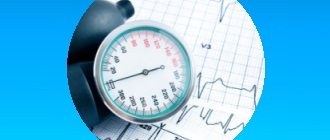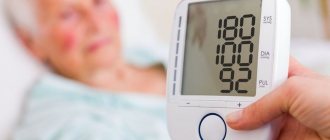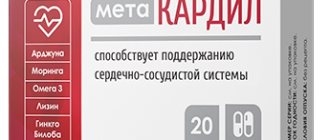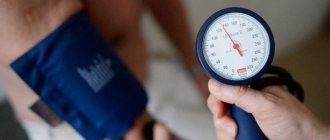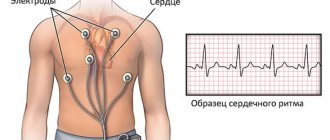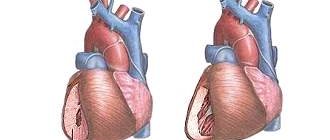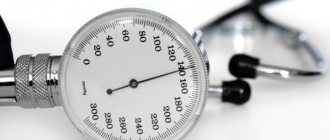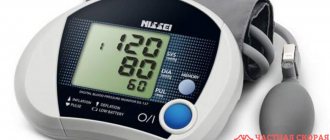Hypertension
(hypertension) is a sustained increase in blood pressure, which requires constant monitoring of your health, as well as timely treatment. Otherwise, the risk of developing dangerous diseases and even death increases.
The human vascular system is a transport network in which transport - blood - is in continuous movement. For blood to move, it must be under pressure. Pressure is created due to the contraction of the heart muscle, as a result of which a new portion of blood is thrown into the arteries with each heartbeat. That is why when measuring pressure, two values are recorded: at the moment of contraction and in a relaxed state. The larger (upper) value is called systolic pressure (systole means “contraction” in Greek), the smaller (lower) value is called diastolic pressure (diastole means “expansion”). Normally, the upper value should be about 120-140 mmHg. Art., lower - about 70-80 mm Hg. Art. For young people, lower rates are normal, for people over 40 years old, higher rates. If the pressure measurement shows values that are higher than those indicated, then such pressure should be considered elevated. A sustained increase in blood pressure is called hypertension
, and the patient is diagnosed with
hypertension (hypertension)
.
Causes of hypertension
Blood pressure fluctuates constantly, and our body is well adapted to such fluctuations. The walls of the vessels through which blood moves are elastic, and when pressure increases, they stretch. As a result, the pressure normalizes. Also, when pressure increases, blood from the arterial vessels goes into the capillaries. That is, the body has an effective mechanism for normalizing pressure. Hypertension develops when, for some reason, this mechanism ceases to function.
Modern medical science does not yet have an exact answer to the question of why hypertension occurs. However, there are a number of factors that can lead to a sustained increase in blood pressure. This:
- overweight (obesity);
- diabetes;
- smoking, alcohol abuse;
- high level of adrenaline in the blood (including as a result of experienced stress);
- atherosclerosis (primarily atherosclerosis of the aorta);
- kidney diseases;
- thyroid diseases;
- taking certain medications (including hormonal contraceptives).
The risk of developing hypertension increases with age. Hypertension in young people is often explained by kidney disease or magnesium deficiency in the body.
Stages and complications of hypertension
Arterial hypertension leads to increased stress on the heart, blood vessels, and kidneys. Hypertension can cause diseases and pathologies such as:
- heart failure, myocardial infarction;
- cerebrovascular accidents (ischemic or hemorrhagic strokes);
- nephrosclerosis, renal failure;
- deterioration of vision (as a result of circulatory disorders in the retina).
Therefore, those who are at risk of developing the disease, as well as those who have already been diagnosed with hypertension, need to monitor their condition and regularly measure their blood pressure.
The following procedure for measuring pressure is recommended. Blood pressure is measured while sitting, after a five-minute rest. The measurement is carried out three times in a row, the lowest values are taken into account.
Depending on the detected pressure, three stages of hypertension are distinguished.
Stage I hypertension
characterized by increases in blood pressure in the range of 160-180/95-105 mmHg. Art.
Stage II hypertension
diagnosed with pressure in the range of 180-200/105-115 mm Hg. Art.
Stage III hypertension
– this is a severe pathological condition in which blood pressure is recorded in the range of 200-230/115-130 mm Hg. Art. This pressure cannot be normalized on its own, without medical help.
First aid for nosebleeds
Let me first tell you what not to do. There is no need to lie down with your head thrown back. Sit down, tilt your head forward, and press the wings of your nose against the septum for a while. You can breathe through your mouth at this time. It is advisable to apply cold to the bridge of the nose. But do not forget that prolonged exposure to cold is undesirable, because it won’t take long for you to catch a cold. The consequence of such excessive zeal can be, at best, a runny nose, and at worst, sinusitis.
If you have hydrogen peroxide, you can place cotton swabs soaked in it in your nostrils. It is also convenient to use a hemostatic sponge specially designed to stop nosebleeds. You can buy it at the pharmacy.
It happens that a nosebleed is caused by a serious injury, then it is unlikely that you will be able to cope with it on your own. Call an ambulance, and if it becomes necessary to take the victim to the hospital yourself, make sure that his head is in an elevated position.
Symptoms of hypertension
High blood pressure can manifest itself as symptoms such as:
- weakness;
- dizziness;
- headache;
- decreased performance.
However, these symptoms may simply be perceived by a person as signs of fatigue. In addition, at the first stage, hypertension can be asymptomatic.
Separately, there is a sudden increase in pressure - a hypertensive crisis
, which can also be considered a complication of hypertension. During a hypertensive crisis, a sharp disruption of blood circulation occurs in the most important organs - the brain, heart, kidneys. Symptoms of a hypertensive crisis are:
- Strong headache;
- darkening of the eyes;
- nausea and vomiting;
- angina pectoris, feeling of increased heartbeat;
- cold sweat, weakness, trembling hands.
Symptoms of stage I hypertension
Possible rises in blood pressure within the range of 160-180/95-105 mm Hg. Art. After rest, the pressure usually returns to normal. There may be no additional symptoms, but tinnitus, heaviness in the head, mild headaches, poor sleep, decreased performance, and sometimes dizziness and nosebleeds may occur.
Symptoms of stage II hypertension
The pressure rises to values in the range of 180-200/105-115 mm Hg. Art. In this case, the increase in pressure turns out to be more stable than in the case of stage I. Stage II hypertension is manifested by headaches and angina, dizziness and hypertensive crises should also be expected. Blood supply to the brain, kidneys and retina is reduced. Possible strokes.
Symptoms of stage III hypertension
Blood pressure is recorded within the range of 200-230/115-130 mm Hg. Art. With this pressure, the likelihood of heart attacks and strokes increases significantly. Irreversible changes occur in the activity of the heart, brain and kidneys.
Methods for diagnosing hypertension
Hypertension is diagnosed by measuring blood pressure. For diagnosis, the method of 24-hour blood pressure monitoring (ABPM) can be used.
It is of great importance to establish the cause of the increase in pressure. Without eliminating the cause, treatment of hypertension cannot be sufficiently effective. In order to establish the cause of arterial hypertension, as well as to determine the degree of damage to internal organs, various instrumental and laboratory studies are carried out.
ECG
ECG is a basic study in cardiology. Allows you to identify heart diseases that are the cause or accompanying hypertension. Holter monitoring (24-hour ECG monitoring) can be used to take an ECG.
More information about the diagnostic method
Echocardiography
Echocardiography for hypertension provides the doctor with information about pathological processes in the patient’s heart. At the first stage of the disease, echocardiography shows an increase in the rate of contraction of the walls of the left ventricle, while the size of the cavities and the thickness of the walls remain within normal limits. In later stages, dilation of the left ventricle can be seen, accompanied by a decrease in its contractility.
More information about the diagnostic method
Ultrasound examinations
In case of persistent increase in blood pressure, ultrasound of the kidneys and adrenal glands, as well as ultrasound of the brachiocephalic and renal arteries, may also be prescribed.
More information about the diagnostic method
Optical coherence tomography
If you have hypertension, it is important to undergo a fundus examination, since increased pressure can lead to pathological changes in this area and cause vision impairment. Fundus examination is best performed using optical coherence tomography. Biomicrography of the fundus using a fundus camera can also be used.
More information about the diagnostic method
Laboratory diagnostics
Examination for hypertension includes laboratory tests. You will need to do blood tests - general and biochemistry (tests for the level of creatinine, potassium, cholesterol and glucose in the blood), as well as a general urine test. Other tests may be ordered.
Sign up for diagnostics To accurately diagnose the disease, make an appointment with specialists from the Family Doctor network.
Disease prevention
Simple lifestyle changes are effective in preventing hypertension. It is necessary to have the most healthy, balanced diet, physical activity and maintaining a healthy weight, reducing the amount of table salt in the diet, and protection from stress. For timely detection of health problems and initial manifestations of hypertension, regular visits to the doctor and medical examination are necessary.
Sources:
- 2013 ESH/ESC Guidelines for the treatment of arterial hypertension. Mancia G., Fagard R. Systemic hypertension No. 4, 2013. p.5-27
- Diagnosis and treatment of arterial hypertension. Chazova I.E., Zhernakova Yu.V. Systemic hypertension No. 1, 2021. p. 6-30
- Genetic aspects of arterial hypertension. N. A. Ivanova, V. A. Pavlov, N. V. Drozdetskaya. Bulletin of the Smolensk State Medical Academy, 2004. p.80
- Arterial hypertension. Frolova E.V. Russian family doctor, 2021. p.6-18
- Arterial hypertension. Zhmurov D.V., Parfenteva M.A., Semenova Yu.V. Colloquium-journal, 2021. p.49-56
Treatment methods for hypertension
The main goal of treating hypertension is to reduce the risk of developing the most dangerous complications (stroke, myocardial infarction, chronic renal failure and nephrosclerosis). To this end, measures are being taken to reduce blood pressure to normal levels and reduce the vulnerability of target organs. The patient needs to be prepared that antihypertensive therapy will be carried out for life. The course of treatment at stages II and III of the disease necessarily includes drug therapy. Treatment of stage I hypertension may not require medications, but may be limited only to non-drug therapy methods. In any case, non-drug therapy for hypertension is very important.
A patient with hypertension should regularly measure blood pressure and follow all instructions of the attending physician.
Which doctor treats hypertension
A cardiologist treats hypertension. Also, treatment of hypertension can be carried out by a general practitioner (general practitioner or family doctor), who often detects high blood pressure when contacting him with complaints of poor health.
Drug therapy
Medicines should be selected by a doctor, who does this taking into account the individual characteristics of each patient.
Lifestyle change
First of all, you need to:
- stop smoking;
- eliminate or reduce alcohol consumption;
- try to reduce weight to normal;
- reduce salt intake to 5 g/day;
- provide regular physical activity. The most beneficial are walking, swimming and therapeutic exercises;
- increase your resistance to stress;
- optimize nutrition (eat more greens, fruits, foods with a significant content of potassium, calcium and magnesium, and, conversely, reduce the consumption of vegetable fats and protein foods). You should eat regularly.
Make an appointment Do not self-medicate. Contact our specialists who will correctly diagnose and prescribe treatment.
What to do if you have high blood pressure: useful tips
Have you noticed symptoms of high blood pressure and are starting to panic? It’s not worth it, just read the advice given by professional therapists:
- First of all, measure it to make sure that the numbers really exceed the norm.
- Provide yourself complete peace and quiet.
- Try to lie down and rest a little, you can even try to fall asleep.
- If you don't see any improvement, pick up the phone and call an ambulance. The arriving team will provide you with proper assistance or hospitalize you for further treatment.
To prevent this problem from happening in the future, eat more vegetables, especially beets, because they are great at fighting the signs of hypertension. Also move more and walk in the fresh air. You can also go in for sports, but you shouldn’t overdo it either; all loads need to be increased gradually.
Don’t be tormented by the question of why I have high blood pressure, because I don’t have bad habits, my heredity is good, and so on. It is better to consult a medical doctor and find out the cause of the ailment.
